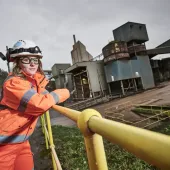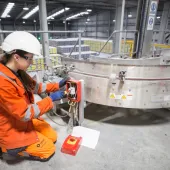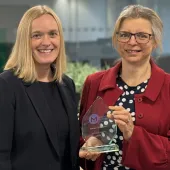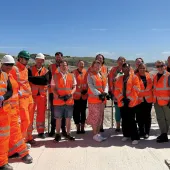Apprenticeships: The Future of the Mineral Extractives Industry?

First published in the November 2018 issue of Quarry Management
The Institute of Quarrying examines the role of apprenticeships in the future of the mineral extractives industry
Apprenticeship programmes are an increasingly popular pathway into the world of work, with many apprentices going on to enjoy successful careers at the highest levels. The quarrying sector is no different, with operators large and small welcoming the flexible approach to personal and professional development both in the workplace and in the classroom.
In the minerals extractives sector, the Institute of Quarrying’s compelling partnership with the University of Derby Centre for Mineral Products delivers a successful higher apprenticeships programme, with 70% of students graduating with a distinction and 68% going on to study Minerals Management at honours degree level.
Over the last 10 years apprenticeships have proven to be an attractive option for both employers and learners. James Thorne, chief executive officer at the Institute of Quarrying (IQ), says: ‘A report released by the Education & Skills Funding Agency revealed that a higher apprentice could earn £150,000 more, on average, over their lifetime compared with those with Level 3 vocational qualifications1. So, it’s no surprise that we are seeing more and more young people pursuing apprenticeships, given the issues surrounding student debt.
‘Apprentices are also good for business. The UK Department for Business, Innovation and Skills reports that for every £1 invested in a Level 2 apprenticeship, £26 is returned; likewise £28 is returned from a Level 3 apprenticeship2.’
The introduction of the Apprenticeship Levy changed how businesses could access funding for apprenticeships. It has brought frustration for many, but in common with many STEM employment sectors, mineral extractives is also faced with the challenge of renewing an ageing workforce. So, are apprenticeships still the future of the mineral extractives industry?
Mark Osbaldeston is head of the Centre for Mineral Products at the University of Derby and a former apprentice himself: ‘The Mineral Products Centre at the University of Derby is renowned for delivering industry-respected qualifications for the mineral extractives industry. The apprenticeship programme we offer is widely supported by all employers in the mineral extractives sector. From day one apprentices are gaining vital experience with their employer as well as getting to grips with the technical and operational aspects of the industry.
‘On top of that, the programme helps apprentices to develop their personal strengths to become more effective communicators, team members and potential future leaders. Our industry programme has a 93% retention rate of its apprentices, much higher than the national average, and demonstrates to other young people how this industry develops and supports career growth.’
Apprenticeships are cementing the way
Louis Curtis is a Higher Apprentice at Aggregate Industries, part of LafargeHolcim Group. He is based at Cauldon cement plant and is studying the Higher Apprenticeship Mineral Products Technology Foundation Degree at the University of Derby.
‘There is a skills gap in the UK construction sector, which will only grow wider if more is not done to attract the next generation into the industry. As apprenticeships are valued as a more economically viable route into full-time employment, there is a real opportunity for employers to work more collaboratively with educational bodies and engage with the future workforce.
‘My own journey within the industry has been extremely rewarding. Not only do I receive formal higher-level education through the University of Derby, but I also have the opportunity to gain qualifications and training relevant to my job role, without a large student loan. I have developed massively in a short period of time, all while becoming more experienced within the workplace.
‘I was not aware of how exciting a career in the cement industry could be. Through developments in digitalization, each day technology is being better utilized, with drones being increasingly used to inspect equipment. That lends itself to attract a more diverse workforce.’
Mr Curtis recently joined the ‘Institute for Apprenticeships Apprentice Panel’, which brings together employers to help develop new apprenticeships in their field. He continues: ‘I want to help promote apprenticeships to others and use my personal experience to make a contribution and influence the Institute’s thinking. My hope is to raise the awareness of the benefits a career within the mineral products industry can offer and champion the work we are doing to achieve this.
‘The future workforce is a generation growing up in the digital era; it is therefore essential to appeal to their interests. Companies need to encourage collaboration, resource sharing, and show that they are embracing technology that appeals to the future workforce’s interests outside of work.’
Kyle Beaven is based at Chipping Sodbury Quarry, near Bristol, and enrolled on Hanson UK’s LEAD Higher Apprenticeship programme in September 2016. Although he received four offers from universities to study business management, Mr Beaven decided an apprenticeship was for him; it offers a great educational opportunity whilst working in a diverse and dynamic industry that is fundamental to the economy and future developments.
‘When I sat down and weighed up my options, the opportunity to work for a market leader, which funds the degree at Derby and is genuinely interested in the development of its employees, the decision became quite obvious. There are many benefits of apprenticeships; you earn while you learn, gain invaluable on-the-job experience and have early employment chances which could potentially be the start of a long and successful career.
‘I do have high career aspirations but I know it’s still early days, so I am going to take things step by step and try not to get too far ahead of myself. The potential is there to have a bright future when you consider all the development prospects. Hanson UK provide great support, plus there are endless opportunities and benefits from being an IQ member.’
James Thorne concludes: ‘Apprenticeships provide routes into and through the industry to the very highest levels. Like many enjoying successful careers in quarrying, Martin Riley, senior vice-president at Tarmac and IQ Chairman, started out as an apprentice. His story is proof of the firm foundations that apprenticeships provide.
‘Our compelling partnership with the University of Derby Centre for Mineral Products delivers tailored learning for young people interested in developing a career in our sector, as well as for those already working in mineral extraction. These industry-standard and globally recognized qualifications have been designed in partnership with the industry and leading professional bodies.
‘They are delivered using blended learning, minimizing the time spent away from work and learners complete work-based projects. That means learning is applied in the workplace straight away. Higher apprenticeships develop competence in the workplace and prepare apprentices for future leadership roles.’
IQ student membership
Anyone on a higher apprenticeship programme qualifies for student membership of IQ. For a short time only, the IQ is offering free membership in 2019 to students who sign up before the end of this year.
Student membership is £20 per year and offers invaluable advice about the skills, training and personal development needs required to build successful industry careers. It is a small investment for what could provide lifelong career opportunities in the future.
For more information, visit: www.quarrying.org/student18
REFERENCES
- Key facts about apprenticeships – Education & Skills Funding Agency: www.gov.uk/government/publications/key-facts-about-apprenticeships/key-facts-about-apprenticeships
- UK Department for Business, Innovation and Skills report, 2015.
- Subscribe to Quarry Management, the monthly journal for the mineral products industry, to read articles before they appear on Agg-Net.com








